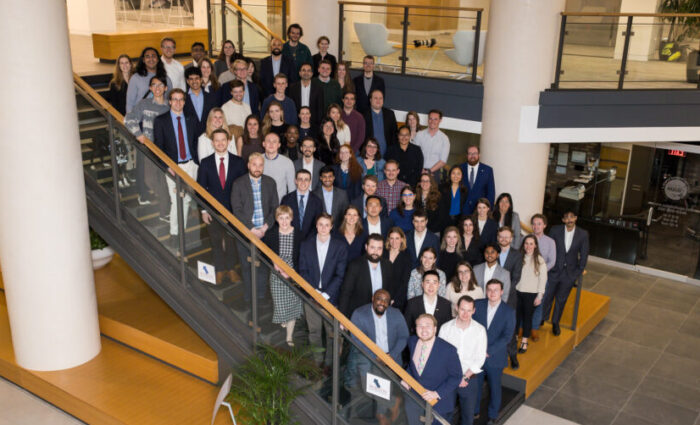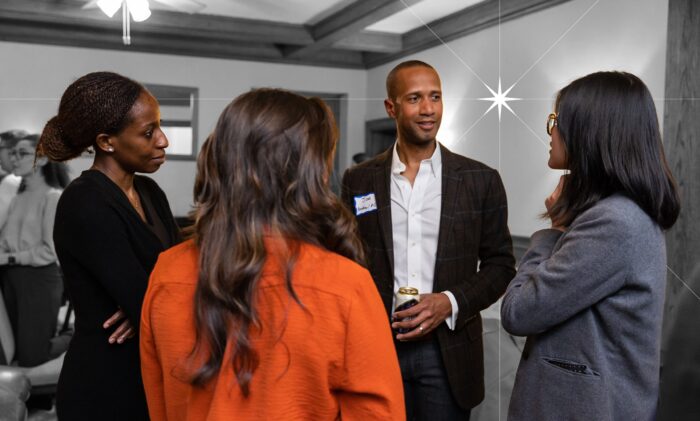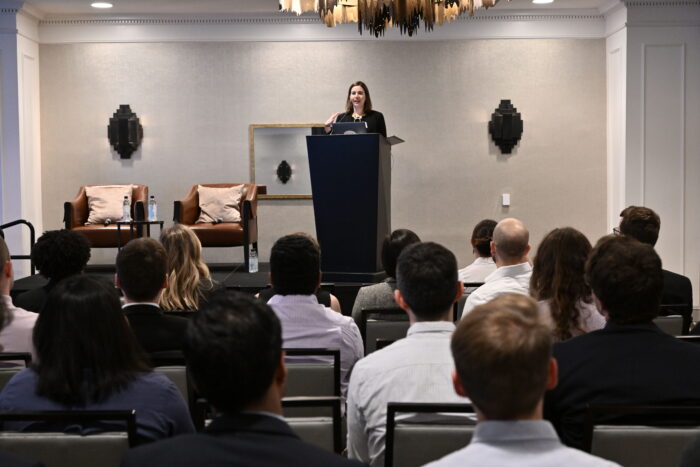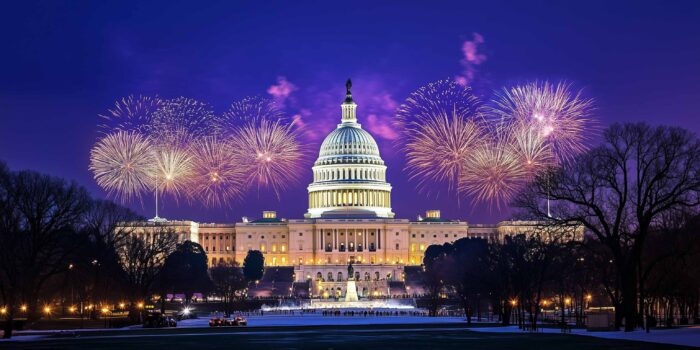Fellow Q&A: Aurelia Attal-Juncqua
This is part of our fellow Q&A series to give prospective applicants and other interested audiences a glimpse at what it’s like to be a Horizon Fellow.

Before becoming a Horizon Fellow, you worked at a range of organizations, including the World Health Organization and the National Academies of Sciences, Engineering, and Medicine public health and pandemic preparedness. What were those experiences like?
I interned at the WHO exactly 10 years ago now, right after I finished graduate school. I worked there across two different departments. The first one was the Neglected Tropical Disease Department working on Chagas disease. After that I rotated teams and focused on antimicrobial resistance (AMR). I mostly did data analysis of surveys that were sent to different member states for WHO’s very first AMR report that came out in 2014. After the WHO, I worked in business intelligence for pharmaceutical companies in London for a couple years, before moving to DC to work at Georgetown’s Center for Global Health Science and Security for three and a half years. That was my main entry into health security and pandemic response. I worked on a post-Ebola recovery project in Guinea, as well as a project on bioweapon policy with the UN.
Most recently, I worked at The National Academies of Sciences, Medicine, and Engineering (NASEM) before starting the Horizon Fellowship. I joined NASEM in January of 2020, right before COVID-19 officially arrived in the US. Most of my work quickly transitioned to COVID-19. The pace of work picked up and there was a much faster response. NASEM set up a standing committee that was doing rapid expert consultation for the White House, for the NIH, and for CDC. I was staffing that committee in the early days of the pandemic, and helping to respond to inquiries coming from the government. I also staffed a committee focused on how to ethically allocate and prioritize the new COVID-19 vaccines. That was very interesting and the speed at which these studies and reports were undertaken was very much not the norm for NASEM, as the organization shifted its work and products in response to the public health emergency. I learned a lot about how different agencies work and how organizations can transition during a crisis.
What was your experience like working in Guinea?
I traveled to Guinea a few times. It was right at the end of the Ebola outbreak in 2016, and the CDC and other partners had helped fund the creation of a new health security agency in Guinea that now works alongside their Ministry of Health. We were doing a lot of work helping train people, organizing workshops, and setting up standard operating procedures on surveillance as well as outbreak prevention, control and response.. We also did some legislative analysis to understand the different ways that this new agency would fit within the existing government while promoting a One Health approach, meaning taking into account humans’ proximity to native animal populations that were potential sources of zoonotic disease outbreaks.
What inspired you to apply for the Horizon Fellowship?
I’m currently a part-time doctoral student at Hopkins, and my advisor, Dr. Gigi Gronvall, who works at Hopkins saw an advertisement for the fellowship. She sent it my way and told me that it looked like a very good opportunity to explore a wide range of work and have more independence. In other large organizations that I worked at before, you are part of a project team and you’re not really your own researcher. She knew that I wanted to do more independent work. So far I have been quite lucky, as the fellowship has been really conducive for that. This may not always be the case, and is dependent on how your focus of interest aligns with your host organization’s mission and its existing project needs.
What has been a highlight of the fellowship so far?
Being able to take the time to read what I want to read and learn what I want to learn, and really understand what my interests are within the world of biosecurity. I’ve had the freedom to create my own research questions and my own projects, and that’s been great. Also, connecting with all the other fellows has been amazing. They all come from different backgrounds and they all have different interests. The network that’s available is also very valuable – the Horizon team has relationships across the policy world. It’s been really enriching to see the access we have to people who work every day on those issues in and out of government.
What is your main research focus now that you are working at the Center for Health Security?
I’ve been working a lot on the bioeconomy. We hosted a workshop: the Biden administration recently signed an executive order related to biomanufacturing and bioeconomy in September. That executive order mentions the creation of a new biosafety and biosecurity innovation mission. We worked with OSTP and NIH to host a workshop at Hopkins where we gathered experts from the government, academia, and the private sector to talk about what the mission should look like, what the barriers are to its creation, and what its main priorities should be. That was really cool.
After that, I’ve continued my work on bioeconomy, biosafety, and biosecurity. I’m currently closing up a project with BioMADE, a biomanufacturing institute that’s funded by the DoD. They’re supporting us as we do expert interviews across the industry to try and understand what the barriers are to the full integration of biosafety, social responsibility, and sustainability in the industry. I’m also trying to research how biotech has been leveraged in outbreaks in the past, as well as what policies have enabled the use and development of these new technologies for prevention and response to outbreaks.
What inspired or fascinated you about bioeconomy? Why did you choose to focus on that during your placement?
There are two reasons. The first is that I’ve always been interested in investigating the risks of technology after working on bioweapon policy with the UN. And then living through COVID-19, we all witnessed the incredible pace at which vaccines were created, along with diagnostic testing and new drug therapies. So while it’s very vivid in my mind that there are clear risks with emerging technologies, it’s also become quite transparent that technology can and should be part of the solution. We’ve lived through a pandemic, and came out of the other side because of advances in science and technology – so I’ve been wanting to really understand how we can leverage technology in a way that’s the most beneficial for future pandemic response and prevention.
Second, I read an article written by Ryan Morhard at Ginkgo Bioworks last summer, and he basically made the case that we need to be able to use technology to make sure that we’re pandemic proof going forward. I have to say, this is a good time to make that case, since the White House is investing so proactively in the bioeconomy, biomanufacturing, and biotechnology. It feels like everything is converging towards that specific sector so it’s the right time and place to dive deeper into these issues and challenges.
What has been a challenge or something you’ve had to learn?
Well, I work mostly from home because I’m in DC and the office is in Baltimore. I’ve had to navigate making sure I’m still part of a team, feeling like I’m part of the work family, knowing what’s going on, what projects are happening, and so on. That’s been a hard thing to do. I try to go in every 2-3 weeks. I think I’ve been doing a decent job at keeping in touch with other researchers at the Center. The Center’s leadership is also quite proactive in ensuring that I’m invited to all their all-staff social events, and setting up regular check-ins with me, which has been wonderful.
What are other challenges? I guess writing more op-eds. Some of the reports or articles we write are quite long and technical and are not always publicly available immediately, and it takes time to write something shorter, public facing after reports are finished. That’s a time management challenge.
How have you stayed in touch with your cohort of Horizon Fellows during your fellowship? What support have you received?
The Slack is amazing! I love how involved everyone is in sharing articles and updates. I think that’s been a really good way to maintain contact on an almost daily basis. There’ve been a few Horizon-held events over the last year that I attended, and that’s always been very fun too. There are biosecurity happy hours that are adjacent to the Horizon Fellowship that a lot of the same people go to.
What advice would you give to someone who is applying for the Horizon Fellowship?
I’ve spoken to a few people who have reached out on LinkedIn to apply, and I’m always happy to do so and answer their questions.. The advice I’ve given is to definitely apply and to think about what you want to get out of the fellowship. Doing that will help you narrow down what sort of placement you want, whether it’s at a think tank or in government or in Congress, and also help you really get the most out of that placement. I’d also say, be ready to learn during the application process itself!



